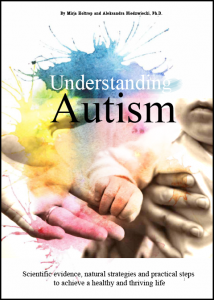Autism comprises a broad spectrum of conditions characterized by low social skills, repetitive behavioral patterns, abnormalities in speech development, and non-verbal communication limitations. Examples include infantile dementia, Asperger syndrome and other developmental disorders.In many popular books on this topic, both autistic individuals and their families learn how to better cope with social interactions.However, most of these books do not address in detail how the underlying condition can be improved.Now there are several scientific findings that highlight a role for micronutrients in the treatment of autism.It has been shown that dietary supplementation with micronutrients can be a natural, safe and effective option for improving the well-being of those affected.
Natural ways to promote well-being in autism
https://edfarmaciaonline.comDietary supplements are very important in autism since they provide essential micronutrients to support certain metabolic pathways.One benefit of dietary supplements is that they can be taken in doses rarely achieved by diet alone.Research shows that appropriately dosed micronutrients can have a profound effect on autistic symptoms.To date, most of the studies investigating micronutrients in autism have been conducted on individual nutrients.However, according to Cellular Medicine, the strongest and most comprehensive health effects are achieved with preparations that contain synergistic ingredients.Some of the key micronutrients which have been scientifically proven to play a role in the treatment of autism include the following:Vitamin D: Maternal vitamin D deficiency during pregnancy increases the risk of autism for the child.Autistic behavior can disappear after high-dose vitamin D therapy.Vitamin A: Scientific research suggests that vitamin A can correct a protein defect which is characteristic of autism and related to speech processing and attention.Glutamine: Serum levels of this amino acid are particularly low in patients with autism.Glutamine serves as a precursor of the nerve messengers (neurotransmitters) glutamate and GABA and is also implicated in the prevention of leaky gut syndrome.Folate: In some cases, folate supplementation may eliminate the symptoms of autism.This is especially the case in patients carrying genetic changes that impair the function of folate-dependent enzymes.Vitamin C decreases the severity of symptoms and improves sensorimotor scores in patients with autism, possibly due to its interaction with dopamine synthesis.Glutathione and cysteine: It has been shown that autistic patients have significantly low levels of these two antioxidant amino acids.This can cause oxidative damage, impair detoxification processes and lead to neurological symptoms.Vitamin B1: A lack of this vitamin is associated with delayed speech development.Supplementation with vitamin B1 can therefore offer great benefits to autism patients.Vitamin B12: A deficiency of this vitamin is associated with delayed speech development, neurological damage, optic neuropathy and vision loss in autistic patients.Vitamin B6: Many autism patients have low vitamin B6 levels.When taking supplemental vitamin B6, they have better eye contact, improved speech and less self-stimulatory behavior.Magnesium: This mineral is important for neurotransmitters, which are responsible for social reactions and emotions.Patients with autism generally have low magnesium levels.Zinc: Low zinc levels are common in children diagnosed with autism.Zinc deficiency impairs the protein metallothionein, which helps in the excretion of heavy metals––such as mercury––from body tissue.Carnitine transports fatty acids into the cells for bioenergy production.A low carnitine status impairs the ability to use fatty acids for learning and social development.Omega-3 fatty acids: Scientific studies suggest that children with autism have very low levels of omega-3 fatty acids.A major component of each brain cell is the highly anti-inflammatory omega-3 fatty acid DHA (docosahexaenoic acid).In terms of supplementation, it is advisable to use sources of omega-3 fatty acids of the highest quality that do not contain mercury.Tyrosine supports dopamine production in brain cells.Low tyrosine levels can lead to dopamine deficiency in the brain, which can cause mood disorders and autistic behavior.Tryptophan is an amino acid that helps the body to produce the neurotransmitter serotonin.Research clearly shows that autistic people often have a damaged tryptophan metabolism, which can alter brain development, neuroimmune activity and mitochondrial function.Further information on autism along with scientific references that support the above information can be found in the brochure “Understanding Autism” by Mirja Holtrop and Dr. Aleksandra Niedzwiecki. If you have any questions about this brochure and any of the subjects it covers, please feel free to contact us.








